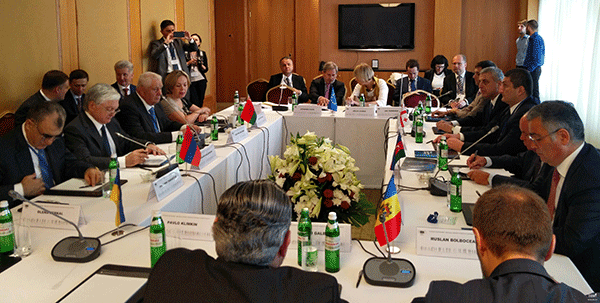On July 11, in Kyiv, Minister of Foreign Affairs of Armenia participated in the Eastern Partnership Informal Dialogue Meeting of the Foreign Ministers, attended by Johannes Hahn, the Commissioner for European Neighbourhood Policy and Enlargement Negotiations, and Helga Schmidt, Deputy Secretary General for the External Action Service.
In his remarks, Minister Nalbandian stressed: “This year we already have met twice – in Prague and Brussels, sharing our vision in regard to the cooperation with European Union and perspectives of multilateral relationship within the Eastern Partnership. We hope the EU will be able to overcome the situation created by the Brexit soon. As for Armenia, we will continue our efforts to further develop and deepen the partnership with the European Union, EU member states as well as the UK.
Months that passed since our last meeting in this format in Tbilisi were fruitful for the Armenia-EU cooperation. Negotiations on a new framework document between Armenia and the European Union were launched last December. This agreement will reflect the depth and essence of our bilateral relations and set new guidelines for enhanced and comprehensive partnership. Four rounds of negotiations have been held so far, recording a steady progress.
The outcomes of the Riga Summit and the Joint Declaration adopted in May 2015 provided a shared vision for our partnership and cooperation in coming years.
Read also
Agreement on the participation of Armenia in the COSME Programme (for small and medium-sized enterprises) was signed last December. A month ago Armenia joined Horizon 2020 programme (for research and innovation). We envisage becoming soon a part to the Creative Europe Programme, (which offers a broader frame for cultural exchanges) and we also expect the negotiations on the Common Aviation Area agreement to start this year.
The enhanced mobility remains one of the important prerequisites for making our societies closer. A month ago third meeting of the Joint Committees on monitoring the implementation of the Visa Facilitation and Readmission agreements took place in Yerevan. The parties highlighted their successful realization. We are looking forward to live up to our joint commitment to secure mobility and contacts between people by launching a Visa Liberalization Dialogue.”
Touching upon the reforms being undertaken in Armenia, Edward Nalbandian outlined: ”The Government of Armenia continues the reform process aimed at the consolidation and strengthening of the democratic institutions. On May 25th the National Assembly adopted the new Electoral Code. The Joint opinion of the Venice Commission and the OSCE/ODIHR recognized “the tangible efforts made by the authorities to take into account the recommendations on the basis of broad engagement with domestic stakeholders” and stated that “the draft electoral code could provide an adequate basis for the conduct of democratic elections.
To take an extra step forward the Government of Armenia continued to work with the opposition and civil society and a deal was signed between the Government and the representatives of the parliamentary opposition to introduce new amendments in order to conduct more fair, inclusive and transparent elections.
In this context, let me note that we highly appreciate the EU’s continued support and assistance provided to our country over the years, which has been instrumental for the effective implementation and sustainability of the reform process and institutional capacity building in Armenia.”
Referring to the efforts aimed at the advancement of negotiation process on the peaceful settlement of Nagorno Karabakh issue, the Foreign Minister of Armenia emphasized: “The Vienna and St. Petersburg Summits were first and foremost aimed at stabilizing the situation in the conflict zone in the aftermaths of large-scale military offensive unleashed by Azerbaijan against Nagorno-Karabakh in April, which was accompanied by the gross violations of international human rights and humanitarian laws. First of all, it is a necessity to implement what was particularly emphasized and agreed upon in the frameworks of the Summits in order to create conditions for the continuation of the negotiation process – the exclusively peaceful settlement of the conflict, the full adherence to the 1994-1995 trilateral ceasefire agreements, which do not have time limitations, the creation of mechanism for the investigation of ceasefire violations, the expansion of the team of the Personal Representative of the OSCE Chairperson-in-Office.
Unfortunately, Azerbaijan after both Summits tries to ignore the reached agreements hindering the advancement of the peace process. Armenia will continue its efforts together with the Co-Chair countries aimed at exclusively peaceful resolution of the Nagorno-Karabakh conflict.”
Concluding his remarks, Minister Nalbandian proposed to host the next Eastern Partnership Informal Dialogue Meeting of the Foreign Ministers in Yerevan.























































